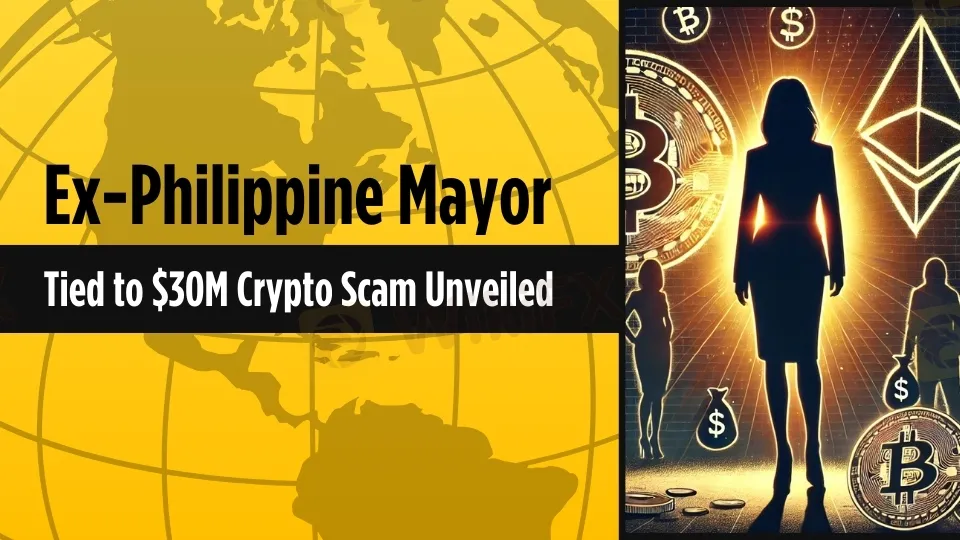简体中文
繁體中文
English
Pусский
日本語
ภาษาไทย
Tiếng Việt
Bahasa Indonesia
Español
हिन्दी
Filippiiniläinen
Français
Deutsch
Português
Türkçe
한국어
العربية
Ex-Philippine Mayor Tied to $30M Crypto Scam Unveiled
Abstract:Former Philippine mayor Alice Guo is tied to a $30M crypto fraud in the Atom Asset Exchange scam, raising concerns about crypto fraud and governance in Southeast Asia.

The crypto world is facing a new scandal as a former Philippine mayor is linked to a $30 million cryptocurrency fraud. Ex-mayor Alice Guos involvement highlights the growing problem of crypto scams infiltrating local governments across Southeast Asia, including Hong Kong.
Revealing the Atom Asset Exchange Scam
The Atom Asset Exchange (AAX) scam is a major case in Southeast Asias crypto world. It connects several high-profile figures to fraud. Former Philippine mayor Alice Guo is accused of stealing $30 million in customer funds. AAX, founded by Su Weiyi in 2019, was once a top-20 global crypto exchange with over 2 million users.
But AAX collapsed when investigators found evidence of fraud. Guo was linked to illegal activities with the companys founders. This raises concerns about how scammers are exploiting local governments in Southeast Asia.

Crypto Scams in Southeast Asia: A Growing Risk
Southeast Asia and Hong Kong have become hotspots for crypto fraud. Scammers use weak regulations in the region to trick inexperienced traders. The AAX scam is just one in a series of fraud cases. Many victims in the $30 million scam didn‘t understand the risks. This shows how much more education and regulation are needed in Asia’s crypto markets.
This incident highlights the urgent need for stronger regulations to stop crypto fraud and protect investors from scams.

As of today, the market cap of cryptocurrencies stood at $2.25 trillion.
Alice Guo's Alleged Role in Crypto Fraud
Alice Guo‘s connection to AAX isn’t her only controversy. Reports show she also had business dealings with Huang Zhiyang, a key figure in the fraudulent Sun Valley Clark Hub Corporation. This group has ties to illegal activities across Southeast Asia and Hong Kong.
The AAX scam is just one part of Guos legal troubles. She and several others now face charges of human trafficking, money laundering, and possible involvement in illegal gambling in the Philippines. These accusations raise serious questions about the transparency and accountability of local officials.
Crypto Fraud and Government Accountability
The involvement of a former Philippine mayor in a high-profile crypto scam shows the need for closer scrutiny of public officials. Southeast Asias governments need to fix the regulatory gaps that let crypto scammers infiltrate local governance.
Regulators and financial crime experts are calling for stronger action against crypto fraud, to make sure public officials are held responsible for their actions.
Conclusion
Alice Guos link to the AAX scam and other crypto fraud in Southeast Asia shows the vulnerability of local governments and cryptocurrency investors. As Southeast Asia remains a target for these scams, regulators need to act now to stop future fraud and protect investors.
Stay updated on the latest crypto scandals and fraud cases in Southeast Asia. Read more about the Atom Asset Exchange scam and Alice Guo's involvement on WikiFX News.

Disclaimer:
The views in this article only represent the author's personal views, and do not constitute investment advice on this platform. This platform does not guarantee the accuracy, completeness and timeliness of the information in the article, and will not be liable for any loss caused by the use of or reliance on the information in the article.
Read more

ATFX Opens New Office in Cape Town's Portside Tower to Expand in Africa
ATFX inaugurates a new office in Cape Town, marking a key milestone in its African expansion, with dedicated teams to enhance local trading services.

Interactive Brokers Enhance Account Security with FDIC Coverage
Interactive Brokers now offers up to $5M FDIC insurance for individual accounts, boosting protection on cash held in brokerage accounts starting May 2025.

Exnova Forex Broker Scam: Blocked Accounts, Lost Funds
Exnova forex broker slammed for scam tactics, blocking withdrawals, and dodging regulation. Victims warn of fraud risks—steer clear!

Nonfarm Data Lifts Market Sentiment, U.S. Stocks Rebound Strongly
U.S. nonfarm payrolls for May slightly exceeded expectations, stabilizing investor sentiment and easing fears of a hard landing. This upbeat data sent U.S. equities broadly higher, led by tech stocks, with the Dow and S&P 500 posting significant gains. However, behind the optimism lies a fresh round of market debate over the Federal Reserve’s rate path, with uncertainty around inflation and interest rates remaining a key risk ahead.
WikiFX Broker
Latest News
IronFX Broker Review 2025: A Comprehensive Analysis of Trustworthiness and Performance
OctaFX Flagged by Malaysian Authorities
Nonfarm Data Lifts Market Sentiment, U.S. Stocks Rebound Strongly
Interactive Brokers Enhances PortfolioAnalyst with New Features
ATFX Opens New Office in Cape Town's Portside Tower to Expand in Africa
Why Your Worst Enemy in Trading Might Be You
Errante Broker Review
SFC Issues Restriction Notice to GA (Int’l) Capital Management Limited Over Regulatory Concerns
WikiFX Forex Community Expert AMA
Interactive Brokers Enhance Account Security with FDIC Coverage
Currency Calculator


